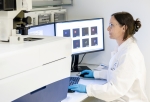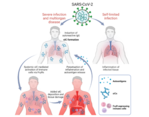
Artificial cytoskeleton made of DNA for synthetic cells
The physicists Prof. Dr. Kerstin Göpfrich and Prof. Dr. Laura Na Liu want to understand life from the bottom up. They intend to do this by constructing an artificial cell. However, rather than natural protein building blocks, they are using 3D-DNA structures as construction material. The first step involved creating an artificial cell skeleton that dynamically assembles and disassembles like the biological model and can transport vesicles.
https://www.gesundheitsindustrie-bw.de/en/article/news/artificial-cytoskeleton-made-dna-synthetic-cells


